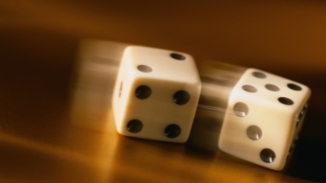
赌博推动科学进步
Gambling Gave Science Some Lucky Breaks
赌博推动科学进步
The development of statistics, probability theory, game theory and chaos theory owes a lot to people trying to figure out various games of chance.
统计学、概率论、博弈论和混沌理论的发展得益于人们对不同游戏的探索。
播音/撰文 史蒂夫·米尔斯基(Steve Mirsky)
翻译 Meatle
审校 乔虹
统筹 李轩
“It’s not just gamblers using science. In many cases, science has benefited enormously from people studying the house.”
“不单单赌博中运用了科学,在许多例子中,科学研究从人们对赌博的研究中获益巨大。”
Mathematician Adam Kucharski. He’s the author of the new book The Perfect Bet: How Science and Math Are Taking the Luck Out of Gambling.
数学家亚当·库哈尔斯基(Adam Kucharski),他是新书《完美的赌局:科学和数学如何受益于赌博》的作者。
“Back in the Renaissance, actually, probability theory was developed to study these games. I mean, can you imagine having bets where it’s not actually clear what a fair game is?”
“在文艺复兴时期,实际已经建立出研究这些游戏的概率论。你能容忍在尚未知道这场赌博是否公平的情况下参加赌局么?”
For example, in the 17th century the question came up, do you have the same chance of throwing a six by rolling one die four times or of throwing two sixes by rolling two dice 24 times?
例如,在17世纪,出现了一个问题:掷一个骰子四次得到一个六的几率跟掷两个骰子24次的到两个六的几率是否一样?
“That had been around awhile, those kinds of bets and those kinds of questions, and that was Fermat and Pascal who developed a lot of this theory. And one of the crucial things was this concept of an expected value: if you play a game repeatedly what do you expect to win on average? And until you have that kind of theory in place it’s very hard to actually compare two bets directly and work out which one is more preferable.”
“这些赌局,以及相关的这些问题存在了很长一段时间。费马(Fermat)和帕斯卡(Pascal)最终建立起了一套理论。这个理论引出了一个重要概念——期望值:如果你重复某项游戏,你会期望平均得到多少。在这种理论形成之前,我们难以对两个赌局进行对比,并指出哪个更符合我们的理想。”
Pascal figured out that your chances of throwing one six in four rolls of a die was slightly more than 50 percent. But your odds of two sixes in 24 throws of two dice was slightly less than 50 percent.
帕斯卡指出,在掷一个骰子4次后,得到一个6的几率略高于50%。然而,掷两个骰子24次得到两个6朝上的几率却略低于50%。
“And a lot of this theory from probability to statistics and actually more recently things like game theory and chaos theory originated with studying games of chance, so I think science actually has benefitted a lot from people’s curiosity about gambling.”
My full interview with Adam Kucharski about his book The Perfect Bet is at our Web site as a Science Talk podcast.
“从概率论到统计学,到新近发展的理论,比如博弈论和混论理论之中,有大量的理论源自于对赌博中几率的研究,因此我认为,事实上,科学的发展得益于人类对赌博的好奇。”我对亚当·库哈尔斯基关于他的新书的书评已经在放在了Science Talk,欢迎收听。
未经书面许可任何人不得复制或镜像
京ICP备11000850号-1
 京公网安备11010502039775号
京公网安备11010502039775号 信息网络传播视听节目许可证0111611号
国家科技基础条件平台

















